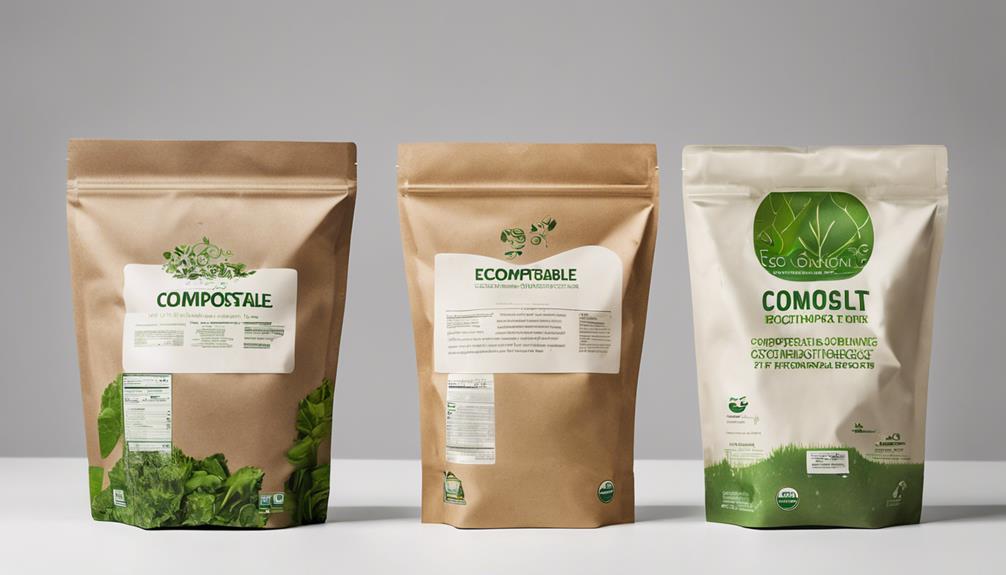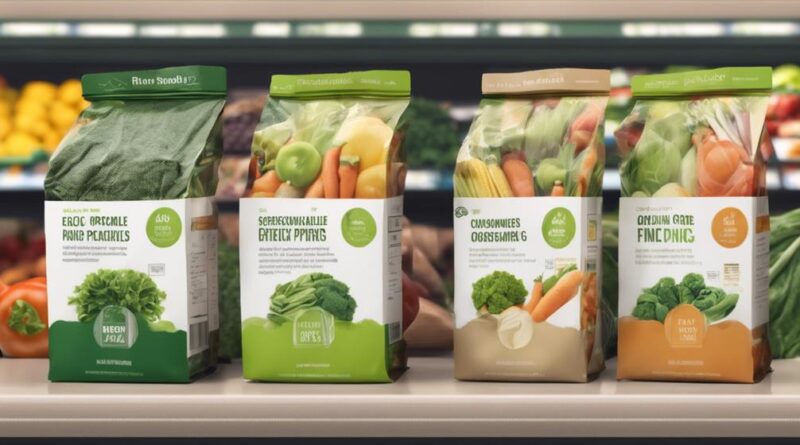Decoding Consumer Choices for Organic Food Packaging
When understanding consumer choices for organic food packaging, consider the preference for sustainable materials like biodegradable options and mycelium-based packaging. Consumers lean towards minimalist designs that convey eco-friendliness and elevate perceived value. Trust is built through transparent labeling and disclosures on material composition. Recyclability, compostability, and organic certifications significantly influence consumer behavior. Sustainable practices not only impact the environment positively but also enhance brand credibility. Remember, decoding these consumer preferences sheds light on the intricate relationship between packaging choices and consumer values.
Eco-friendly Packaging Materials
When considering eco-friendly packaging materials for organic food products, manufacturers prioritize sustainability and environmental impact over traditional packaging options. In the quest for innovative solutions, sustainable materials are at the forefront of market trends. Sustainable packaging materials aim to reduce the environmental footprint left by traditional packaging methods while still providing cost-effective options for manufacturers.
One of the most significant trends in eco-friendly packaging materials is the shift towards biodegradable and compostable options. These materials, often derived from plant-based sources such as cornstarch, sugarcane fiber, or bamboo, offer a renewable and environmentally friendly alternative to conventional plastics. Not only are they sustainable, but they also cater to the growing consumer demand for products with minimal environmental impact.
Additionally, manufacturers are exploring innovative solutions like mushroom packaging, which uses mycelium, the root structure of fungi, to create biodegradable packaging materials. This process not only provides a sustainable alternative but also reduces waste by utilizing agricultural byproducts.
As market trends continue to emphasize the importance of sustainability and environmental responsibility, the development of cost-effective eco-friendly packaging materials becomes increasingly crucial. By investing in research and development of these materials, manufacturers can meet consumer demands for environmentally conscious products while also reducing their overall carbon footprint.
Importance of Biodegradability
Biodegradability plays a pivotal role in the sustainability of packaging materials for organic food products, ensuring minimal environmental impact and efficient waste management. Choosing biodegradable packaging offers numerous benefits that align with eco-conscious consumer preferences. Biodegradable materials have the inherent ability to break down naturally into simpler, non-toxic compounds, reducing the burden on landfills and ecosystems. This characteristic is particularly essential when considering the disposal of packaging after use, as traditional non-biodegradable materials can persist in the environment for hundreds of years, contributing to pollution and resource depletion.
The environmental impact of non-biodegradable packaging is significant, with plastic waste being a primary concern due to its persistence in the environment. In contrast, biodegradable packaging materials offer a more sustainable alternative by decomposing into organic matter, which can be reintegrated into the ecosystem without causing harm. This process contributes to a circular economy model, where resources are utilized efficiently and waste is minimized.
Minimalist Design Preferences
Considering consumer preferences for sustainable packaging options, the design of organic food packaging is increasingly leaning towards minimalist aesthetics. Sustainable branding has become a focal point for companies looking to attract environmentally conscious consumers. By adopting a minimalist design approach, brands can convey a sense of eco-friendliness and simplicity that resonates with the modern consumer.
Minimalist design preferences extend beyond just aesthetics; they also reflect a shift towards a more sustainable way of packaging products. Consumers are often drawn to packaging that uses fewer materials and focuses on essential elements. This not only reduces waste but also aligns with the minimalist lifestyle that many individuals are embracing today.
Modern aesthetics play a crucial role in the appeal of minimalist design. The clean lines, simple color schemes, and uncluttered layouts associated with minimalist packaging convey a sense of sophistication and elegance. These design elements can elevate the perceived value of the product and attract consumers who appreciate the fusion of sustainability and style.
Consumer Perception of Recyclability
Consumer perception of recyclability significantly influences their purchasing decisions in the realm of organic food packaging. Recycling habits play a crucial role in shaping consumer trust towards brands that offer organic products. Research indicates that consumers are more likely to choose organic food items that come in recyclable packaging due to their growing environmental consciousness. This shift towards eco-friendly packaging is driven by the desire to reduce waste and minimize the impact on the environment.
Moreover, greenwashing concerns have amplified the importance of transparent communication regarding recyclability. Consumers are becoming more discerning about claims made by brands regarding the sustainability of their packaging. They're looking for concrete evidence of recyclability rather than vague statements that could be perceived as greenwashing. Brands that can demonstrate a genuine commitment to recyclability build credibility with consumers and are more likely to earn their loyalty.
In this context, brand credibility plays a significant role in influencing consumer perception. Brands that have a proven track record of using recyclable materials and promoting sustainable practices are viewed more favorably by environmentally conscious consumers. The alignment between a brand's messaging on recyclability and its actual practices is crucial for establishing trust and loyalty among consumers in the organic food packaging market.
Influence of Organic Certification
How does organic certification impact consumer preferences for organic food packaging materials?
Organic certification plays a significant role in influencing consumer choices when it comes to selecting organic food packaging. Consumers often associate organic certification with higher standards of quality, sustainability, and environmental responsibility. This association stems from the perception that products carrying organic certifications are more natural, healthier, and produced without harmful chemicals or pesticides.
Organic certification not only serves as a quality assurance measure but also acts as a powerful branding influence. Brands that display organic certification on their packaging signal to consumers that they've met specific standards set by certifying bodies. This branding influence can enhance consumer trust in the product and the packaging it comes in. When consumers see the organic certification logo on packaging, they're more likely to believe that the product is authentic, environmentally friendly, and aligns with their values.
Consumer trust is a crucial factor in driving purchasing decisions, especially in the organic food sector where authenticity and sustainability are paramount. Organic certification helps build this trust by providing consumers with a clear and recognizable indicator of a product's organic status. By choosing packaging materials that align with organic certification standards, brands can leverage consumer trust and cater to the growing demand for sustainable and environmentally friendly packaging solutions.
Impact of Sustainable Practices
Sustainable practices in organic food packaging manufacturing have a direct impact on environmental conservation and long-term resource management. Consumer behavior plays a crucial role in driving the demand for sustainable packaging solutions. Research indicates that consumers are increasingly drawn to products that are packaged using eco-friendly materials and methods. This shift in consumer preferences has led to a surge in the market trends towards sustainable packaging options.
Market trends reflect a growing awareness among consumers regarding the environmental impact of conventional packaging materials. As consumers become more informed about the benefits of sustainable practices in packaging, they're making choices that align with their values. Companies that adopt sustainable practices not only meet consumer expectations but also contribute to the overall reduction of environmental footprint associated with packaging waste.
Moreover, sustainable practices in organic food packaging resonate with consumers who prioritize environmentally conscious purchases. By using materials that are recyclable, biodegradable, or sourced from renewable resources, companies can appeal to this segment of the market. Understanding consumer behavior and market trends is essential for businesses looking to stay competitive in the organic food packaging industry. Embracing sustainable practices not only benefits the environment but also attracts a growing number of consumers seeking products that reflect their commitment to sustainability.
Preference for Compostable Packaging

The increasing awareness of environmental impacts associated with conventional packaging materials has paved the way for a notable preference shift towards compostable packaging options in the organic food industry. Compostable packaging offers several benefits that align with the environmentally conscious consumer's preferences.
Compostable packaging is derived from renewable resources such as plant-based materials like cornstarch, sugarcane bagasse, or cellulose. These materials decompose naturally into non-toxic components, enriching the soil and reducing waste sent to landfills. By choosing compostable packaging, consumers contribute to reducing the burden on landfills and lowering greenhouse gas emissions associated with traditional plastic packaging production.
The environmental impact of compostable packaging extends beyond disposal. The production of compostable packaging generally requires less energy than conventional plastic packaging, leading to a reduced carbon footprint. Additionally, compostable materials are often biodegradable, breaking down into organic matter that can be used to enrich soil quality. This circular approach to packaging aligns with the principles of a sustainable food system and resonates with environmentally conscious consumers looking to minimize their ecological footprint.
Role of Transparency in Labeling
Transparency in labeling plays a crucial role in informing consumers about the origins and composition of organic food packaging materials. When it comes to organic food packaging, consumers prioritize transparency as it builds trust and provides clarity regarding the product they're purchasing. Labeling serves as a direct communication channel between the manufacturer and the consumer, influencing purchasing decisions significantly.
- Building Trust: Transparent labeling instills confidence in consumers as they can trace the journey of the packaging materials used.
- Origin Details: Clear labeling provides information about where the packaging materials were sourced, indicating sustainability and ethical practices.
- Material Composition: Transparency in labeling discloses the composition of the packaging, helping consumers make informed choices based on their environmental concerns.
- Certifications: Labels showcasing organic, biodegradable, or compostable certifications enhance trust and credibility in the product.
- Environmental Impact: Transparent labeling educates consumers about the environmental impact of the packaging, enabling them to align their values with their purchasing decisions.
Conclusion
In conclusion, consumer choices for organic food packaging are heavily influenced by:
- Eco-friendly materials
- Biodegradability
- Minimalist design
- Recyclability perception
- Organic certification
- Sustainable practices
- Compostable options
- Transparent labeling
Understanding these factors is essential for businesses looking to cater to the growing demand for sustainable packaging solutions in the organic food industry. By prioritizing these preferences, companies can effectively meet the needs and expectations of environmentally-conscious consumers.
